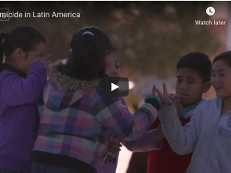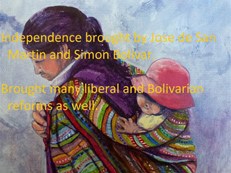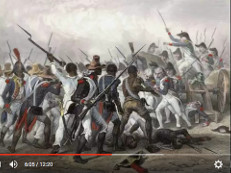A conversation with Rita De Grandis (video)
Posted in Interview Videos, Week 12 Videos | Tagged with Argentina, C20th, democracy, dictatorship, gender, neoliberalism, resistance, Rita De Grandis, violence, women
Posted in Lecture Videos, Week 6 Lecture | Tagged with affect, Argentina, Brazil, C19th, discourse, gender, history, liberalism, race, rights, slavery, women
This week’s topic focused on rights and emancipation, particularly in the aspects of race and gender. It is quite jarring to think about the reality of race and the effects it had — and frankly still has — on both North and South America. For instance, the very fact that the last abolition date of […]
Posted in Blogs, Week 6 | Tagged with echenique, emancipation, gender, Pelliza de Sagasta, rights, slavery
This week’s reading posed an interesting comparison between North and South America. Initially, it seemed as though North America had some version of high ground due to the lack of participation in the slave trade in comparison to southern neighbors. Yet that seemed to be completely unaligned with the history I have learned about the United States. I found it really interesting how race and slavery were so intertwined. The United States created an impossible situation for people of color as their entire identity was based upon the history of slavery. When freed slaves visited Brazil they felt a better sense of equality than at home. I wondered what this actually looked like in practice. What was day to day life like for a person of color in Rio? While both were clearly immoral and abominable in the treatment of people of color it’s quite interesting to try and understand each country in the context of the other.
I also found it interesting to read Latin American feminist accounts. Growing up in the U.S. we frequently read suffrage narratives and responses and I found that they were remarkably similar to these accounts. In particular, I found the idea of poetry to be an interesting addition to debates about female rights. Poetry seems to mean two things, both the poetry that is frequently thought of as women’s education and also the idea that women have a sort of poetic way in which they carry themselves. Interestingly both authors write with an intrinsic poeticness, each piece heavily saturated with metaphor and imagery. Echenique has a more relevant argument, sighting the increase of capitalistic tendencies in society should motivate change for women who are less philosophical and engaged in the physical world instead. Pelliza de Sagasta’s contrasting argument was not what I expected; she argues that subservience is the natural way that women should exist. Unlike Echenique’s piece, she sources older authors like Sinués de Marco, rather than focus on the ways in which Latin American society was rapidly developing.
Race and gender are interesting points of comparison; lost within this is is the overlap. I wanted to hear from women in more marginalized communities if there were documents. Did the fight for racial equality outweigh the fight for gender equality? Or was there forms of resistance in both aspects?
Posted in Blogs, Week 6 | Tagged with gender, race
This week’s reading posed an interesting comparison between North and South America. Initially, it seemed as though North America had some version of high ground due to the lack of participation in the slave trade in comparison to southern neighbors. Yet that seemed to be completely unaligned with the history I have learned about the United States. I found it really interesting how race and slavery were so intertwined. The United States created an impossible situation for people of color as their entire identity was based upon the history of slavery. When freed slaves visited Brazil they felt a better sense of equality than at home. I wondered what this actually looked like in practice. What was day to day life like for a person of color in Rio? While both were clearly immoral and abominable in the treatment of people of color it’s quite interesting to try and understand each country in the context of the other.
I also found it interesting to read Latin American feminist accounts. Growing up in the U.S. we frequently read suffrage narratives and responses and I found that they were remarkably similar to these accounts. In particular, I found the idea of poetry to be an interesting addition to debates about female rights. Poetry seems to mean two things, both the poetry that is frequently thought of as women’s education and also the idea that women have a sort of poetic way in which they carry themselves. Interestingly both authors write with an intrinsic poeticness, each piece heavily saturated with metaphor and imagery. Echenique has a more relevant argument, sighting the increase of capitalistic tendencies in society should motivate change for women who are less philosophical and engaged in the physical world instead. Pelliza de Sagasta’s contrasting argument was not what I expected; she argues that subservience is the natural way that women should exist. Unlike Echenique’s piece, she sources older authors like Sinués de Marco, rather than focus on the ways in which Latin American society was rapidly developing.
Race and gender are interesting points of comparison; lost within this is is the overlap. I wanted to hear from women in more marginalized communities if there were documents. Did the fight for racial equality outweigh the fight for gender equality? Or was there forms of resistance in both aspects?
Posted in Blogs, Week 6 | Tagged with gender, race
This week’s reading posed an interesting comparison between North and South America. Initially, it seemed as though North America had some version of high ground due to the lack of participation in the slave trade in comparison to southern neighbors. Yet that seemed to be completely unaligned with the history I have learned about the United States. I found it really interesting how race and slavery were so intertwined. The United States created an impossible situation for people of color as their entire identity was based upon the history of slavery. When freed slaves visited Brazil they felt a better sense of equality than at home. I wondered what this actually looked like in practice. What was day to day life like for a person of color in Rio? While both were clearly immoral and abominable in the treatment of people of color it’s quite interesting to try and understand each country in the context of the other.
I also found it interesting to read Latin American feminist accounts. Growing up in the U.S. we frequently read suffrage narratives and responses and I found that they were remarkably similar to these accounts. In particular, I found the idea of poetry to be an interesting addition to debates about female rights. Poetry seems to mean two things, both the poetry that is frequently thought of as women’s education and also the idea that women have a sort of poetic way in which they carry themselves. Interestingly both authors write with an intrinsic poeticness, each piece heavily saturated with metaphor and imagery. Echenique has a more relevant argument, sighting the increase of capitalistic tendencies in society should motivate change for women who are less philosophical and engaged in the physical world instead. Pelliza de Sagasta’s contrasting argument was not what I expected; she argues that subservience is the natural way that women should exist. Unlike Echenique’s piece, she sources older authors like Sinués de Marco, rather than focus on the ways in which Latin American society was rapidly developing.
Race and gender are interesting points of comparison; lost within this is is the overlap. I wanted to hear from women in more marginalized communities if there were documents. Did the fight for racial equality outweigh the fight for gender equality? Or was there forms of resistance in both aspects?
Posted in Blogs, Week 6 | Tagged with gender, race
Anna Lake-Soros and David Waine on rights from the Aztecs to the present
Posted in Student Videos - 2014, Week 6 Videos | Tagged with Aztecs, Bolivia, Citizenship, colonialism, gender, Haiti, indigeneity, Mexico, Peru, race, rights





